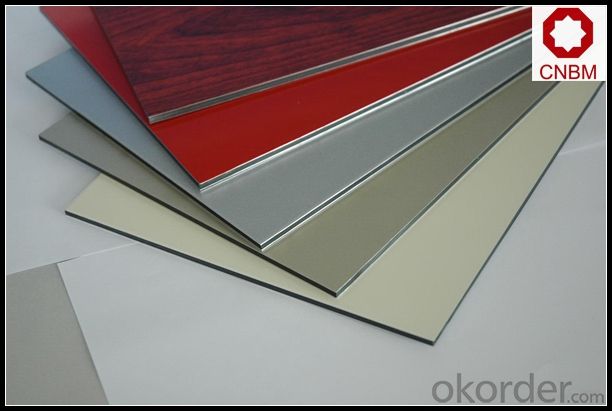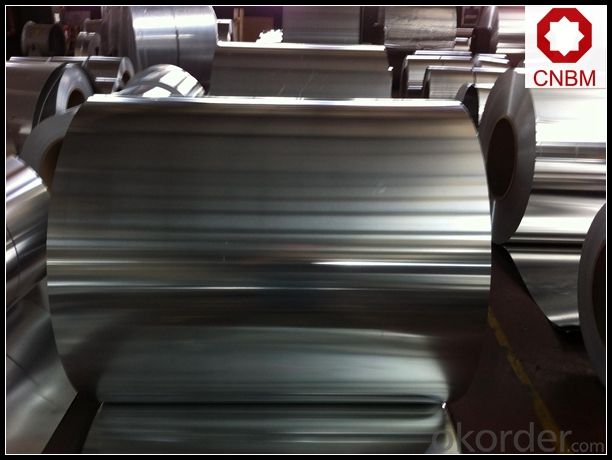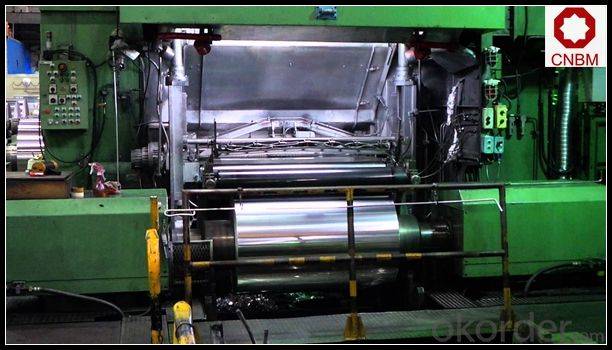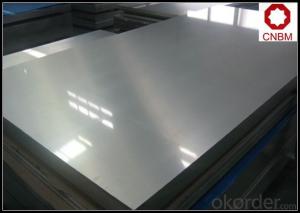Stucco Embossed Aluminum Coill for Transportation
- Loading Port:
- Shanghai
- Payment Terms:
- TT OR LC
- Min Order Qty:
- 5 m.t.
- Supply Capability:
- 10000 m.t./month
OKorder Service Pledge
OKorder Financial Service
You Might Also Like
Item specifice
1. Specification of Stucco Embossed Aluminum Coill for Transportation
1) Alloy | 1050, 1060,1100, 3003 3004 3105 3A21 5005 5052 etc |
2) Temper | O/H12/H14/H1/H18/H32/H34/H36/H38//H111/H112/H116/H321/T6/T651/T3/T351 etc |
3) Thickness | 0.1mm to 6mm |
4) Width | 20mm to 3300mm |
5) Coil weight | 100kgs to 6 tons depends on actual requirement |
6) Core material | Aluminum or paper |
7) Coil Inner diameter | 75mm, 150mm, 200mm, 300mm, 405mm, 505mm or as required |
8) Protective film can be added
2. Application of Stucco Embossed Aluminum Coill for Transportation
(1).Interior: wall cladding, ceilings, bathrooms, kitchens and balconies, shutters, doors...
(2).Exterior: wall cladding, facades, roofing, canopies, tunnels,column covers , renovations...
(3).Advertisement: display platforms, signboards, fascia, shop fronts...
3. Feature of Stucco Embossed Aluminum Coill for Transportation
*Such coil is specially designed to replace aluminum ingot, due to the high export tax of aluminum ingot, the coil has better price than ingot.
*This type of coil can fit customer's remelting furnace just like ingot, no need to make any change to the production line that was previously used for ingot. The standard coil size and weight is very suitable for the feed gate of furnace.
*This type of coil causes less material wastage than ingot when remelted.
*Our coil is made directly from ore, no need to go though the ingot making process, quality is much better than other suppliers who use ingot scrap to make coil.
Be free from Oil Stain, Dent, Inclusion, Scratches, Stain, Oxide Dicoloration, Breaks, Corrosion, Roll Marks, Dirt Streaks and other defect which will interfere with use
4. Certificate:
SGS and ROHS(if client request, paid by client), MTC(plant provided), Certificate of Origin(FORM A, FORM E, CO), Bureau Veritas and SGS (if client request, paid by client), CIQS certificate
5. Image of Stucco Embossed Aluminum Coill for Transportation



6. Package and shipping of Stucco Embossed Aluminum Coill for Transportation
eye to wall
eye to the wall
with wood pallet (wooded case also available)
7. FAQ
1) What is the delivery time?
Dpends on actual order, around 20 to 35 days
2)What is the QC system:
We have QC staff of 20 persons and advanced equipment, each production is with MTC traced from Aluminum ingot lot.
3) What market do you mainly sell to?
Australia, America, Asia, Middle East, Western Europe, Africa etc
- Q:What are the regulations and standards governing the production of aluminum coils?
- The production of aluminum coils is governed by a variety of regulations and standards to ensure product quality, safety, and environmental sustainability. These regulations may vary depending on the country or region, but there are some common industry standards that are widely recognized. One of the primary regulations governing the production of aluminum coils is related to product quality and specifications. Aluminum coils must meet specific standards set by organizations such as the American Society for Testing and Materials (ASTM) or the International Organization for Standardization (ISO). These standards define the physical and chemical properties that the aluminum coils must possess, such as thickness, width, tensile strength, and chemical composition. In terms of safety, there are regulations in place to protect workers and facilities involved in the production process. Occupational Safety and Health Administration (OSHA) regulations, for example, outline safety measures and requirements to prevent accidents and ensure safe working conditions. This may include guidelines for handling and storing aluminum coils, personal protective equipment requirements, and emergency response protocols. Additionally, environmental regulations play a crucial role in the production of aluminum coils. These regulations aim to minimize the impact of the production process on the environment and ensure sustainable practices. For instance, there may be regulations regarding the treatment and disposal of waste materials, the use of energy-efficient equipment, and the reduction of greenhouse gas emissions. Furthermore, industry-specific organizations such as the Aluminum Association in the United States or the European Aluminium Association in Europe also establish voluntary standards and best practices for the production of aluminum coils. These organizations work closely with manufacturers to develop guidelines for quality control, sustainability, and continuous improvement in the industry. Overall, the production of aluminum coils is governed by a combination of regulations and standards that encompass product quality, safety, and environmental considerations. Compliance with these regulations ensures the production of high-quality aluminum coils that meet customer requirements and contribute to a sustainable and responsible industry.
- Q:Are there any limitations to the widths of aluminum coils?
- Yes, there are limitations to the widths of aluminum coils. The maximum width is determined by various factors such as the capabilities of the manufacturing equipment, transportation limitations, and the desired application of the aluminum coils. Additionally, the thickness and weight of the coil can also influence the maximum width that can be achieved.
- Q:This is not for around the house. It is for my lab. I am pretty sure these one wires are Aluminum, but I need the connector they were made with and the power cable is copper. Would it be okay to still try to join the two.
- The main problem with aluminum wiring is cold creep. When aluminum wiring warms up, it expands. When it cools down, it contracts. Unlike copper, when aluminum goes through a number of warm/cool cycles it loses a bit of tightness each time. To make it worse, aluminum oxidizes, or corrodes when in contact with certain types of metal, so the resistance of the connection goes up. Which causes it to heat up and corrode/oxidize still more. Eventually the wire starts getting very hot, the insulation melts or it damages the fixture it's attached to, and possibly even cause a fire. Anything attached to aluminum wiring should be rated for it. It will be stamped with Al/Cu or CO/ALR. Wires should be properly connected (at least 3/4 way around the screw in a clockwise direction). Connections should be very tight. Any connections using push-in terminals should be redone with the proper screw connections. Connections between aluminum and copper wire need to be handled specially. The NEC requires that the wire be connected together using special crimp devices, with a special anti-oxidant grease. The tools and materials for this are expensive - not practical to do it yourself unless you can borrow the tool. Good luck.
- Q:0.6mm insulation aluminum coil price insulation aluminum coil where to buy the most assured?
- If the surface of the aluminum color, it is directly on the Internet search color coated aluminum roll can be.
- Q:Can aluminum coils be used in marine applications?
- Yes, aluminum coils can be used in marine applications. Aluminum is a popular choice for marine applications due to its excellent corrosion resistance, lightweight nature, and high strength-to-weight ratio. It is commonly used in the construction of boats, ships, and other marine structures. Aluminum coils are particularly useful in marine applications as they can be easily formed into various shapes and sizes, making them suitable for different parts and components in the marine industry. Additionally, aluminum coils can withstand harsh marine environments and are highly resistant to saltwater corrosion, which is a significant concern in marine applications. Overall, the use of aluminum coils in marine applications is a reliable and effective choice.
- Q:Can aluminum coils be anodized?
- Yes, aluminum coils can be anodized. Anodizing is an electrochemical process that enhances the natural oxide layer on the surface of aluminum, making it thicker, more durable, and resistant to corrosion. This process is commonly used for aluminum sheets, plates, and coils. Anodizing can be performed on both flat and formed aluminum coils, providing them with a range of attractive colors and finishes. The anodized coating also improves the aluminum's ability to accept paint and adhesives, making it a popular choice for various applications such as architectural cladding, automotive trim, and electronic components.
- Q:Can aluminum coils be used in food processing applications?
- Food processing applications can utilize aluminum coils, as they offer a range of advantages. Aluminum is a widely used and highly adaptable material in the food industry due to its various benefits. Aluminum coils are lightweight, durable, and possess excellent thermal conductivity, which makes them suitable for applications requiring efficient and uniform heat transfer. When it comes to food processing, aluminum coils are commonly employed in equipment such as heat exchangers, evaporators, and refrigeration units. These coils help to cool, heat, or maintain the temperature of different food products during their processing, storage, or transportation. The exceptional thermal conductivity of aluminum ensures that heat is evenly dispersed, thereby aiding in the preservation of food quality and flavor. Furthermore, aluminum is a non-toxic and non-reactive metal, meaning it has no adverse effects on the taste or composition of the processed food. It is also naturally resistant to corrosion, ensuring that the coils do not contaminate the food and can be easily cleaned and maintained. In addition, aluminum is an environmentally friendly and recyclable material, aligning with the increasing demand for sustainable practices in the food industry. Its lightweight nature also contributes to energy efficiency and reduced transportation expenses. In conclusion, aluminum coils are a reliable, efficient, and safe choice for food processing applications. They meet the strict requirements of the industry while ensuring the quality and safety of the processed food.
- Q:What are the common applications of aluminum coils?
- Aluminum coils are widely used in various industries due to their unique properties and versatility. Some of the common applications of aluminum coils include: 1. HVAC Systems: Aluminum coils are extensively used in air conditioning and refrigeration systems, where they play a crucial role in heat transfer. The lightweight and excellent thermal conductivity of aluminum make it an ideal choice for these applications. 2. Transportation Industry: Aluminum coils are commonly used in the automotive and aerospace industries. They are used to manufacture radiators, condensers, evaporators, and other heat exchange components in vehicles. The high strength-to-weight ratio of aluminum helps in reducing the overall weight of the vehicle, leading to improved fuel efficiency. 3. Construction Sector: Aluminum coils find extensive use in the construction industry. They are used in the production of gutters, downspouts, roofing, and cladding materials. Aluminum's corrosion resistance and durability make it a preferred choice for outdoor applications that require long-lasting performance. 4. Electrical Industry: Aluminum coils are used in the production of cables and wires due to their excellent electrical conductivity. They also find use in transformers and power distribution systems. 5. Packaging Industry: Aluminum coils are widely used in the packaging industry. They are used to produce various types of packaging materials, such as cans, foils, and containers. Aluminum's ability to form a barrier against moisture, light, and oxygen makes it ideal for preserving the freshness and quality of food and beverages. 6. Marine Applications: Aluminum coils are used in the marine industry for manufacturing boats, ships, and other offshore structures. Aluminum's resistance to corrosion in saltwater environments makes it a suitable choice for these applications. 7. Industrial Equipment: Aluminum coils are utilized in various industrial equipment, including heat exchangers, condensers, and evaporators. Their thermal conductivity and corrosion resistance properties make them suitable for efficient heat transfer. In summary, aluminum coils have a wide range of applications across multiple industries, including HVAC, transportation, construction, electrical, packaging, marine, and industrial equipment. Their lightweight, excellent thermal conductivity, corrosion resistance, and durability make them a preferred choice for various applications.
- Q:Can aluminum coils be used for electrical transmission lines?
- Yes, aluminum coils can be and are commonly used for electrical transmission lines. Aluminum has several advantages that make it a suitable choice for transmission lines. First, aluminum is a lightweight material, which makes it easier and more cost-effective to transport and install. Second, aluminum is a good conductor of electricity, with similar conductivity to copper. Third, aluminum is less expensive than copper, making it a more economical option for long-distance transmission lines. However, there are some challenges associated with using aluminum coils in transmission lines. Aluminum has a lower tensile strength compared to copper, which means that it is more prone to sagging over long distances. Additionally, aluminum has a higher thermal expansion coefficient than copper, which can cause issues with thermal expansion and contraction. Despite these challenges, proper design and engineering can ensure that aluminum coils are used effectively and efficiently in electrical transmission lines.
- Q:Can aluminum coils be used for heat recovery systems?
- Yes, aluminum coils can be used for heat recovery systems. Aluminum is a highly conductive material, which makes it an excellent choice for transferring heat. Aluminum coils are often used in heat exchangers and heat recovery systems to efficiently transfer heat from one medium to another. These coils are designed to maximize surface area, allowing for greater heat transfer. Additionally, aluminum is lightweight and corrosion-resistant, making it durable and suitable for various applications in heat recovery systems.
1. Manufacturer Overview |
|
|---|---|
| Location | |
| Year Established | |
| Annual Output Value | |
| Main Markets | |
| Company Certifications | |
2. Manufacturer Certificates |
|
|---|---|
| a) Certification Name | |
| Range | |
| Reference | |
| Validity Period | |
3. Manufacturer Capability |
|
|---|---|
| a)Trade Capacity | |
| Nearest Port | |
| Export Percentage | |
| No.of Employees in Trade Department | |
| Language Spoken: | |
| b)Factory Information | |
| Factory Size: | |
| No. of Production Lines | |
| Contract Manufacturing | |
| Product Price Range | |
Send your message to us
Stucco Embossed Aluminum Coill for Transportation
- Loading Port:
- Shanghai
- Payment Terms:
- TT OR LC
- Min Order Qty:
- 5 m.t.
- Supply Capability:
- 10000 m.t./month
OKorder Service Pledge
OKorder Financial Service
Similar products
New products
Hot products
Hot Searches
Related keywords





























